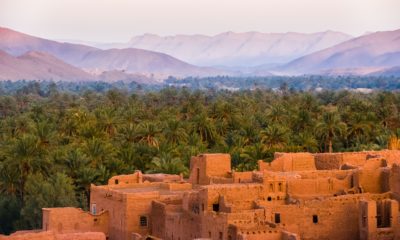Africa
Average Monthly Salary in the World: Morocco, the Best-Ranked Country in North Africa
The American business magazine “Ceoworld” published in mid-August a ranking of countries with the highest average monthly salaries in 2022. To establish its ranking, “Ceoworld” examined and compared the average monthly salary in 105 countries around the world. According to the results, Switzerland tops the ranking. South Africa comes first in the continent, while Morocco is the best ranked country in North Africa.

Something new in terms of country rankings in the world. In mid-August, the American business magazine “Ceoworld” published a ranking of the countries with the highest average monthly salaries in 2022. Switzerland comes first with an average monthly salary of $6142.10. Singapore comes second with an estimated average monthly salary of $4350.79. Australia is third with $4218.89 per month.
In fourth place is the United States with an average monthly salary of $3721.64. The United Arab Emirates is fifth in this ranking with $3663.27 per month. Norway ($3457.69 /month, 6th), Canada ($3338.62/month, 7th), Denmark ($3294.72/month, 8th), Iceland ($3237.11/month, 9th), the Netherlands ($3215.52/month, 10th), Qatar ($3168.05/month, 11th).
Read more about the average monthly salaries in the world and find the latest business headlines in the world with the Born2Invest mobile app.
South Africa leads the continent
In Germany (14th), the average monthly salary reaches $2835.59, in the United Kingdom ($2764.57, 16th), Japan ($2476.7, 20th), France ($2331.13, 22nd), South Korea ($2180.33, 23rd). Among Arab countries, Saudi Arabia is 25th with an average monthly salary of $1888.86, followed by Kuwait (26th) with $1854.45 and Bahrain (28th) with $1728.74.
In Northern Mediterranean countries such as Spain (29th), the average monthly salary reaches $1711.66; while in Italy (31st), it is $1496.4.
In Africa, it is Cyril Ramaphosa’s country that is far ahead. Indeed, South Africa is ranked 34th, with an average monthly salary estimated at $1362.35. It is even placed ahead of China (39th with an average monthly salary of $1362.35), as well as Russia (48th place) where the average salary is estimated at $824.25, Lebanon ($837.19 dollars/month, 47th place), and Palestine ($778.81/month, 52nd place), which are in the middle of the ranking.
Morocco dominates in North Africa
At the bottom of the table, we find Morocco in 86th place with an average monthly salary of $385.53, Tunisia in 96th place with $277.44/month, our eastern neighbor in 98th place with an average monthly salary of $249.67, and Egypt with an average monthly salary of $219.7, which places it in 100th place among 105 countries.
In short, Morocco pays its employees much better than its North African neighbors. That said, it should be noted that this ratio is the gross national income per capita, GNI per capita (formerly GNP per capita), of most countries in the world. It is gross national income converted to U.S. dollars using the World Bank’s Atlas method, divided by the mid-year population. Per capita income is often used as an indicator of wealth, especially between different countries. Its calculation differs from the approach used by the High Commission for Planning (HCP).
To determine the average wage, the HCP adds up the wages of all Moroccans, regardless of their level, and then divides this total by the number of employees. Thus, it is possible to calculate the average salary of a profession, a status, a company… Although interesting, the average salary figure should be taken with care, since it exaggerates the importance of very high incomes. In other words, the average is “inflated” by very high incomes, which in reality only concern a minority of employees. In short, the last HCP study on average wages in Morocco dates from 2021, when it conducted a survey on the social distribution of income in the Kingdom.
Carried out with a sample of 3,290 households, the survey covered the entire national territory and social strata. It showed that the total income of Moroccan households is estimated at 767.14 billion dirhams annually. And that urban households had a total income 2.8 times higher than their rural counterparts, respectively 564.02 billion dirhams for the former and 203.12 billion dirhams for the latter.
The average annual income per household was $8,700 (91,933 dirhams), which was equivalent to an average monthly income of $725.6 (7,661 dirhams). The average annual income is $9327.5 (98,483 dirhams) in urban areas ($777.3 (8,207 dirhams) per month) and $7349.6 (77,600 dirhams) in rural areas ($612.5 (6,467 dirhams) per month). On a per capita basis, the national average annual income was $2037.7 (21,515 dirhams), which was equivalent to an average monthly wage of $169.8 (1,793 dirhams). Converted into dollars, this ratio was $199.22 last year. That is well below the average wage reported by “Ceoworld”.
Increase in the minimum wage in sight
In 2022, the legal minimum wage in Morocco in the industry, commerce, and liberal professions sector is $1.4 (14.81 dirhams)/hour, or $267.9 (2,828.71) dirhams per month (based on 191 hours worked per month). After the various deductions, the net monthly minimum wage is around $249.85 (2,638 dirhams).
In the agricultural sector, the daily SMAG is equal to $7.25 (76.70 dirhams)/day. For 30 working days per month, the SMAG in Morocco in 2022 is $217.9 (2,301 dirhams) gross. The average wage in Morocco in the public sector has increased from $505 (5,333 dirhams) net in 2007 to $780 (8,237 dirhams) in 2021, an increase of 54%.
The minimum wage in the public sector has risen from $150.2 (1,586 dirhams) in 2007 to $312.5 (3,300 dirhams) in 2021, which means that it has more than doubled in the last 15 years. And under the terms of the latest social agreement of April 2022, the government is committed to raising the minimum wage in the public sector to $331.5 (3,500 dirhams).
__
(Featured image by Alexander Mils via Unsplash)
DISCLAIMER: This article was written by a third party contributor and does not reflect the opinion of Born2Invest, its management, staff or its associates. Please review our disclaimer for more information.
This article may include forward-looking statements. These forward-looking statements generally are identified by the words “believe,” “project,” “estimate,” “become,” “plan,” “will,” and similar expressions. These forward-looking statements involve known and unknown risks as well as uncertainties, including those discussed in the following cautionary statements and elsewhere in this article and on this site. Although the Company may believe that its expectations are based on reasonable assumptions, the actual results that the Company may achieve may differ materially from any forward-looking statements, which reflect the opinions of the management of the Company only as of the date hereof. Additionally, please make sure to read these important disclosures.
First published in LES ECO.ma, a third-party contributor translated and adapted the article from the original. In case of discrepancy, the original will prevail.
Although we made reasonable efforts to provide accurate translations, some parts may be incorrect. Born2Invest assumes no responsibility for errors, omissions or ambiguities in the translations provided on this website. Any person or entity relying on translated content does so at their own risk. Born2Invest is not responsible for losses caused by such reliance on the accuracy or reliability of translated information. If you wish to report an error or inaccuracy in the translation, we encourage you to contact us.

-

 Crypto5 days ago
Crypto5 days agoCaution Prevails as Bitcoin Nears All-Time High
-

 Africa2 weeks ago
Africa2 weeks agoMorocco’s Wheat Dependency Persists Despite Improved Harvest
-

 Biotech1 week ago
Biotech1 week agoEcnoglutide Shows Promise as Next-Generation Obesity Treatment
-

 Markets2 weeks ago
Markets2 weeks agoCocoa Prices Drop Amid Speculative Selling and West African Supply Concerns















